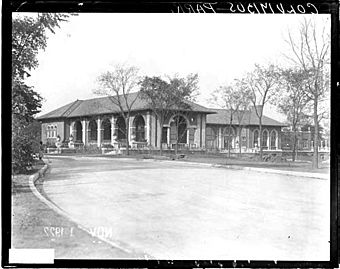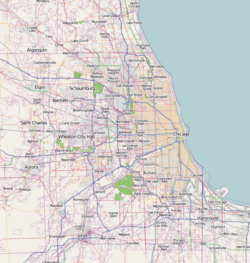Columbus Park (Chicago) facts for kids
|
Columbus Park
|
|

Columbus Park Boathouse
|
|
| Location | 500 S. Central Ave Chicago, IL |
|---|---|
| Built | 1915 |
| Architect | Jens Jensen, Chatten & Hammond |
| Architectural style | Late 19th And 20th Century Revivals, Prairie School |
| MPS | Chicago Park District MPS |
| NRHP reference No. | 91000567 |
Quick facts for kids Significant dates |
|
| Added to NRHP | May 20, 1991 |
| Designated NHLD | July 31, 2003 |
Columbus Park is a large park covering 135 acres. It is located on the far West Side of Chicago, Illinois. You can find it in the Austin neighborhood.
This park is considered the best work by a famous landscape architect named Jens Jensen. Because of its importance, it was named a National Historic Landmark in 2003. This means it's a very special place in American history.
Contents
Discovering Columbus Park's History
How the Park Began
The idea for Columbus Park started in 1912. The West Park Commission wanted to create more places for people to play and relax. At that time, the West Side of Chicago had almost 900,000 people. But there were only two small playgrounds for everyone.
The commission bought the land for the park in 1911. They paid $560,000 to a Catholic church. The church had planned to build a school for priests there, but changed their minds. Columbus Park was the first big park planned by the commission since 1869.
Meet Jens Jensen, the Park's Designer
Jens Jensen was an immigrant from Denmark. He started working for the park commission in the 1880s as a laborer. He worked his way up to become the chief landscape artist and general superintendent by 1905. Columbus Park was Jensen's first very large park project. He started designing it in 1915.
Building the Park and Later Changes
Most of the park was finished by 1920. However, Jensen was removed from his job by the Illinois Governor. This meant the last part, the refectory and boathouse, was not completed by him.
The new park commissioners hired a different architectural firm, Chatten & Hammond. They finished the boathouse in 1923. Even though it looked different from Jensen's original plan, people liked the new building.
In the late 1930s, a government program called the Works Progress Administration helped the park. They provided money to turn an old stable into a gymnasium. They also helped replant many areas of the park.
Sadly, in 1953, about 9 acres of the southern part of Columbus Park were removed. This was to make space for a major road called the Eisenhower Expressway.
Restoration and Recognition
The park's beautiful waterfalls and surrounding areas were fixed up in 1991. The boathouse was also restored a few years later. Columbus Park was officially listed on the National Register of Historic Places on May 20, 1991. It became a National Historic Landmark on July 31, 2003.
The American Institute of Architects considers Columbus Park one of "150 great places in Illinois". In 2018, it was also chosen as one of the Illinois 200 Great Places to celebrate the state's 200th birthday.
Exploring the Park's Landscape Design
Jensen's Prairie School Style
The 135-acre park shows off Jensen's special design style called the Prairie School approach. This way of designing parks focused on the natural beauty of the area. It was inspired by the flat, wide-open spaces of the prairie landscape.
Jensen liked to use plants that grew naturally in the area. This was a new idea at the time. He also used natural rock formations, like those found in the Midwest. You can see his stonework in the park's waterfalls, special stone circles, and stone paths.
Buildings in the Park
Some buildings in the park were built before 1920. They also show Jensen's Prairie School style. For example, Schmidt, Garden & Martin designed large stone lanterns for the east entrance. There is also a small playground shelter that may have been designed by another famous Prairie School architect, John S. Van Bergen.
 | Ernest Everett Just |
 | Mary Jackson |
 | Emmett Chappelle |
 | Marie Maynard Daly |


